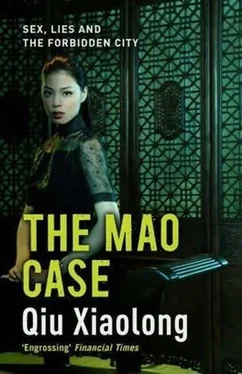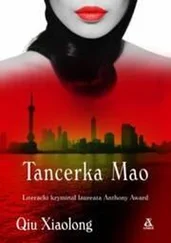“The across-bridge noodles,” Gang said excitedly, opening the rice wine bottle by knocking it against the table corner, raising his chop-sticks for an invitation gesture as if he were the host. “So we can have the beef for wine. Auntie Yao is really considerate.”
“But some special teams were also sent over from Beijing, I’ve heard, from the Cultural Revolution Group of the Central Party Committee.”
“Why are you interested in that?” Gang said, looking up. “I’m a writer,” Chen said, producing a business card provided by the Writers’ Association. “I’m going to write a book about those years.”
“Well, that’s something worth doing, Little Chen. Young people nowadays have no idea about the Cultural Revolution, or if anything at all, only about Red Guards being evil monsters. There should be some objective, realistic books about those years,” Gang said, putting down his chopsticks again. “Back to your question. Who headed the Cultural Revolution Group of CCPC in Beijing then? Madam Mao. Who’s behind her? Mao. When those teams were sent to Shanghai, they were very powerful, capable of doing anything – beating, torturing, and killing people without reporting to the police bureau or worrying about consequences. In short, they were like the emperor’s special envoy brandishing the imperial sword.”
“But did they contact your organization? After all, they were like dragons from somewhere far away, and you were the biggest local snakes.”
“It was usually a small team with a secret mission. Occasionally, they could require our cooperation. For instance, if they wanted to crack down on someone, we would provide all the help, and if need be, keep other organizations away from the target.”
“Do you remember Shang?”
“Shang – just that she was an actress. That’s all I remember.”
“A special team came for her during the campaign of Sweeping Away the Four Olds. She committed suicide.”
“So that’s what you want to find out.” Gang drained his cup in one gulp. “You can’t find a better one to help you, Little Chen. I happened to have learned something about those special teams. Some actors knew about Madam Mao in the thirties – about her notorious private life as a third-rate actress. That’s why she wanted to silence those people, persecuting them to death and destroying any incriminating evidence – like old newspapers or old pictures – old stuff, no question about that. What Madam Mao did during the campaign was mentioned as part of her crimes at the trial of the Gang of Four.”
“That’s a possibility.” Though not much of a possibility in Shang’s case, Chen reflected, raising the cup to his lips without tasting it. Shang was much younger, incapable of possessing information or material about Madam Mao’s years as an actress.
“But I’m not sure about Shang. It’s not a name I remember about those days,” Gang went on, pouring himself another cup. “Perhaps I was too busy. But I can try to contact my then assistant about it. I haven’t seen him in years.”
“It would be great if he could remember something.”
“You treat me like a man of the state, and as such, I should naturally do something in return.”
“I really appreciate it,” Chen said, adding his cell phone number to the business card. “Don’t call the office number. I’m not usually there.”
“Oh, you’re a city representative too.” Gang examined the business card closely. “The other day when you condescended to sit with me, I knew you were different. You’re somebody, Little Chen. Now, you’re always welcome to drop in here, but you don’t have to drink with me. Otherwise Auntie Yao would kill me.”
“What are you two talking about?” Auntie Yao said, moving over to the table on full alert.
“About what a gold-hearted woman you are, having tolerated a good-for-nothing drunkard like me for so many years.”
“Anything else?” she said to Chen without responding to Gang.
“No, I’m leaving. Thank you,” he said rising. “Don’t worry, Auntie Yao. Gang told me not to drink with him. I’ll have nothing but noodles next time.”
IT WAS A WARM and bright morning outside the eatery. Glancing at his watch, Chen changed his mind about the visit to his mother. Next time, he told himself. After the Mao Case, perhaps. He should have asked Auntie Yao to deliver some food to her. It was quite close, Chen thought belatedly, hurrying to the subway station at the intersection of He’nan and Nanjin Roads.
Squeezing into the train, he failed to find a seat. He had a hard time even trying to stand firm without being elbowed around. During rush hour in the city, taxis crawled like ants, while the subway was at least guaranteed to move. He thought of Gang again, a disabled man who would never be able to get in a train like this one. In his college years, the ex-Red Guard must have studied the classics, the way he filled his conversation with quotes. People should be responsible for their own actions, but Gang had been so young and hot-blooded then, choosing to follow Mao. And a high price Gang had paid for it.
It was getting hotter in the train. Chen wiped the sweat from his forehead and neck. The train increased its speed with a sudden lurch, and he staggered, stepping on the foot of a young girl, who was seated reading a morning newspaper. He murmured his apology. She smiled and went on beating her sandaled feet on the train floor. Wearing a yellow summer dress like a butterfly, she reminded Chen of Yang.
Tapping Gang could be a hopeless long shot, but the chief inspector couldn’t leave any stone unturned. He had a heavy heart, holding himself responsible for two cases, rather than one – the two possibly interrelated, though the connection was still beyond his grasp.
Half an hour later, he arrived at Xie Mansion, his shirt sweat-soaked. He felt obliged to comb his damp hair with his fingers before pressing the bell.
As a result of the murder case, the weekend party and class were cancelled. People didn’t believe Xie was involved, but no one wanted to be there when the cops were dropping in and out, asking questions and occasionally requesting statements.
Jiao walked out to open the door for him. “Oh welcome, Chen. You are the only visitor today. Mr. Xie doesn’t feel well this morning. After the shock, you know. But he’ll come down shortly.”
She was wearing a pink and white mandarin dress, sleeveless and almost backless. A fashionable variation of the elegant high-class dress, but with a white apron tied over it, her feet in pink satin slippers.
“I am too early,” he said, wondering what she was doing there, with no class or party scheduled that day.
“Don’t worry about that.” Aware of his curious glance at her apron, she added, “I’ve come to help a little.”
“That is so considerate of you.”
“I’m no cook, but he doesn’t know anything about the kitchen. Please be seated,” she said, producing a cut-glass bowl containing assorted dried fruit. “What would you like to drink?”
“Coffee.”
“Good. I’ve just made a fresh pot for myself.”
She behaved as though she were the hostess there. After serving him a mug of coffee, she glided back to the sofa close to the French window. There was a cup of coffee beside an antique typewriter on a mahogany corner table. She must have been sitting there, by herself.
There was a small sketch against the wall. It could be hers, just finished. He didn’t start speaking at once. He sat quietly sipping at his coffee, seemingly at ease.
Looking at him, she might be wondering at the purpose for his visit. The high slits of the mandarin dress revealed her shapely legs.
“I’m concerned about Mr. Xie,” he said. “I know a couple of good attorneys. If necessary, I could contact them for him.”
Читать дальше












